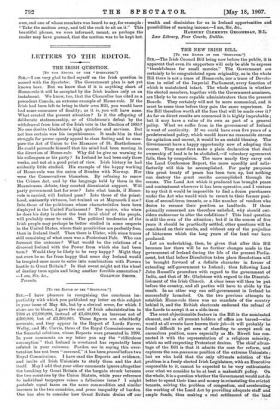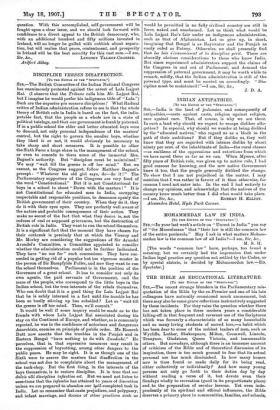THE NEW IRISH BILL.
[To TWA EDITOR OF TUE .SP601,7011....]
Sin,—The Irish Council Bill being now before the public, it is apparent that even its supporters will only be able to express "thankfulness for small mercies." The Government are certainly to be congratulated upon originality, as in the whole Bill there is not a trace of Home-rule, nor a trace of Devolution in relief of the Imperial Parliament, every function of which is maintained intact. The whole question is Whether the elected members, together with the Government nominees, are likely to be more capable administrators than the present Boards. They certainly will not be more economical, and it must be some time before they gain the same experience. Is the Bill therefore worth all the fuss that will be made over it ? As far as direct results are concerned it is highly improbable ; but it may have a value of its own as part of a general policy. What we suffer from in the government of Ireland is want of continuity. If we could have even five years of a predetermined policy, which would leave no reasonable excuse for agitation and unrest, it would be an untold blessing. The Government have a happy opportunity now of adopting this course. They must first make a plain declaration that dual ownership of land is to be abolished,—if voluntary agreement fails, then by compulsion. The more nearly they carry out the Land Conference Report, the more speedily and satisfactorily will this be accomplished. For party purposes this great treaty of peace has been torn up, but nothing can destroy the great results accomplished through its means. The Land Act which it produced has brought peace and contentment wherever it has been operative, and I venture to say that it would be impossible to find a dozen purchasers under the Act who would wish to revert to their former position of second-term tenants, or a like number of vendors who desire to resume their position as landlords. If those primarily concerned are therefore 'satisfied, why should outsiders endeavour to alter the conditions P This land question is still the crux of the situation ; but if in the course of five years it should be practically settled, other questions will be considered on their merits, and without any of the prejudice of bitterness which the long years of the land war have produced.
Let an undertaking, then, be given that after this Bill
becomes law there will be no further changes made in the government of Ireland during the life of the present Parliament, but that before Dissolution takes place Resolutions will be brought forward of a definite character in favour of extending self-government to Ireland; thus following Lord John Russell's procedure with regard to the government of India, and that of Mr. Gladstone with regard to the Drsestablishment of the Irish Church. A clear issue will then be put before the country, and all parties will have to abide by the result. In no other way can self-government in Ireland -be successfully launched. On the two previous attempts to establish Home-rule there was no mandate of the country behind it, and the British electorate endorsed the refusal of the Lords to accept it as a side-issue.
The most objectionable feature in the Bill is the nominated element, and as all present holders of office 'are barred=who would at all events have known their job—it will probably be found difficult to get men of standing to accept such' an anomalous position, more especially as Mr. Birrell has connected it with the representation of a religious minority, which no self-respecting Protestant desires. The chief advantage of the Bill is that it admits the case for refOrm, and captures the non-possumus position of the extreme Unionists ; but we who hold that the only ultimate solution of the problem is a freely elected Irish Legislature, with an Executive responsible to it, cannot be expected to be very enthusiastic over what we consider to be at best a makeshift policy. On the whole, it is a question whether the Government would not do better to spend their time and money in reinstating the evicted tenants, solving the problem of congestion, and accelerating the working of the Land Act by providing adequate staff and ample funds, thus making a real settlement of the land question. With this accomplished, self-government will be fought upon a clear issue, and we should look forward with confidence to a direct appeal to the British democracy, who, with an additional hundred and fifty millions invested in Ireland, will no longer be gulled with rubbish about separation, but will realise that peace, contentment, and prosperity in Ireland will he the best security for this vast sum.—I am, Sir, &c., LINDSEY TALBOT-CROSBIE. Ardfert Abbey.







































 Previous page
Previous page